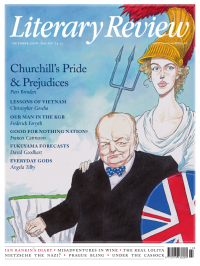Jeremy Clarke
When It Came in Bottles
Red and White: An Unquenchable Thirst for Wine
By Oz Clarke
Little, Brown 643pp £25
In 1978, aged twenty-one and still drunk from the night before, I was put in a line of about thirty itinerant grape pickers. At either end of the line was an old French peasant woman. Stretching away before each of us was a long row of vines hung with bunches of fat black grapes. The foreman directed us to start snipping our way down our row. He said our line should aim to keep up with the old women. Secateurs were distributed, illegally sharp ones, I heard tell afterwards. We bent to our task.
While reading this encyclopaedic wine survey cum memoir by half-man, half-basset hound Oz Clarke, I remembered this moment. Has Clarke ever sampled a Tavel 1978, I wondered? Because if he has, doubtless that extraordinarily sensitive bugle would have detected somewhere in the sulphurous bouquet smoother notes of spilled English blood. Forty years later, two fingers and the thumb of my left hand still bear the scars of my first proper experience of wine.
We pickers were accommodated in a barn. Our free daily wine allowance, dictated by French law, was three litres per picker. The Spanish gypsies were up in arms about this because from time immemorial it had been seven. I liked the Spanish gypsies and associated with them in the evenings. They must have liked me also, because they invited me to shed yet more of my blood in a blood-mingling ritual binding me eternally to their race. A white mark on my forearm still bears witness to that. You might, therefore, allow that I know a bit about wine, even though the gut rot that they gave us for our daily allowance put me off drinking the stuff for life.
Ten years ago, however, Bacchus for a joke tried again to get me to dance with his nymphs and shepherds. A newspaper sent me up the Burgundy Canal on a luxury barge to sample all thirty-three Burgundy grands crus. Mornings were devoted to wine lectures given by a short, saintly Frenchman wearing Scottish tweed. I’ve forgotten his name, but I shall never forget his enthusiasm for Burgundy and the concept of terroir. (If we hadn’t been so respectable-looking, he said, he would have led us up the slopes of the Côte de Beaune and made us eat a handful of soil each.) For five mornings this man told us everything he knew about Burgundy. At the end of the week he told us that none of it mattered. Wine was made for enjoyment, he said, not analysis.
Sometimes of an evening we would go out to dinner at a chateau with the owner of some world-famous domaine or other. Sometimes they would come to us for dinner on board and bring a bottle. Or twenty. By the end of these dinners the table was forested with glasses and empty bottles of Chambertin or Romanée-Conti or Meursault or Puligny-Montrachet – or you name it. As instructed, I had stuck my big nose into each glass and inhaled. Then I had taken a sample sip and run the wine around my mouth. And what had been the effect on my consciousness of these wines, worth five hundred or a grand or three grand a pop? Was it a sense of ‘the season’s sweetest rose trampled beneath a dashing captain’s riding boots’ (Clarke being facetious)? Or was it ‘the songs of armies sweeping into battle, the roar of waves upon the rocky shore, the glint of sunshine after rain on forest leaves, the depths of a church organ, the voice of children singing hymns’ (Clarke quoting legendary Irish wine critic Maurice Healy on Chambertin)?
‘Mmm. Not bad,’ I said, or something equally banal but truthful. These top-drawer wines were smoother than any wine I had ever tasted. And moreish. If Romanée-Conti were a soft drink that came in cans decorated with laughing orange monsters and I spotted some in the newsagent’s chiller, I’d probably start buying it. Shame on me – I know. But let me add that if I’d dared say it aloud, the little Burgundian teacher in the Scottish tweed, with his scholar-monk’s humility and his passion, would not only have accommodated that view, but also have respected it.
Clarke is equally slow to judge his fellows, and his prose style is democratic and conversational. Paragraphs might begin with ‘So’ or ‘Anyway’ or even ‘Hmm’. I got used to it. After a while I liked it. The breadth of Clarke’s knowledge and experience, coupled to a conspicuous absence of pomposity, makes for easy and entertaining reading. Moreover, this part-memoir, part-survey of the world’s wines is bang up to date on everything, from the latest viticultural machinery through global trends in taste to the stark and undeniable effects of accelerating global warming on wine production. Red and White is, I imagine, another one of Bacchus’s periodic tries to get me to join the dance. So. Hmm. Guess what? I think I might have heard his piping faintly on the wind.

Sign Up to our newsletter
Receive free articles, highlights from the archive, news, details of prizes, and much more.@Lit_Review
Follow Literary Review on Twitter
Twitter Feed
Russia’s recent efforts to destabilise the Baltic states have increased enthusiasm for the EU in these places. With Euroscepticism growing in countries like France and Germany, @owenmatth wonders whether Europe’s salvation will come from its periphery.
Owen Matthews - Sea of Troubles
Owen Matthews: Sea of Troubles - Baltic: The Future of Europe by Oliver Moody
literaryreview.co.uk
Many laptop workers will find Vincenzo Latronico’s PERFECTION sends shivers of uncomfortable recognition down their spine. I wrote about why for @Lit_Review
https://literaryreview.co.uk/hashtag-living
An insightful review by @DanielB89913888 of In Covid’s Wake (Macedo & Lee, @PrincetonUPress).
Paraphrasing: left-leaning authors critique the Covid response using right-wing arguments. A fascinating read.
via @Lit_Review